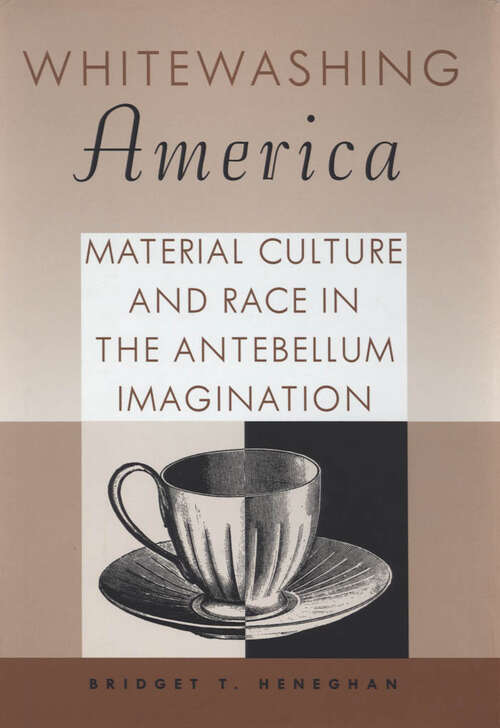Whitewashing America: Material Culture and Race in the Antebellum Imagination (EPUB Single)
By:
Sign Up Now!
Already a Member? Log In
You must be logged into Bookshare to access this title.
Learn about membership options,
or view our freely available titles.
- Synopsis
- Even before mass marketing, American consumers bought products that gentrified their households and broadcast their sense of "the good things in life." Bridging literary scholarship, archaeology, history, and art history, Whitewashing America: Material Culture and Race in the Antebellum Imagination explores how material goods shaped antebellum notions of race, class, gender, and purity. From the Revolutionary War until the Civil War, American consumers increasingly sought white-colored goods. Whites preferred mass-produced and specialized products, avoiding the former dark, coarse, low-quality products issued to slaves. White consumers knit around themselves refined domestic items, visual reminders of who they were, equating wealth, discipline, and purity with the racially "white." Clothing, paint, dinnerware, gravestones, and buildings staked a visual contrast, a portable, visible title and deed segregating upper-class whites from their lower-class neighbors and household servants. This book explores what it meant to be "white" by delving into the whiteness of dishes, gravestone art, and architecture, as well as women's clothing and corsets, cleanliness and dental care, and complexion. Early nineteenth-century authors participated in this material economy as well, building their literary landscapes in the same way their readers furnished their households and manipulating the understood meanings of things into political statements. Such writers as James Fenimore Cooper and John Pendleton Kennedy use setting descriptions to insist on segregation and hierarchy. Such authors as Harriet Beecher Stowe, Nathaniel Hawthorne, Edgar Allan Poe, and Herman Melville, struggled to negotiate messages of domesticity, body politics, and privilege according to complex agendas of their own. Challenging the popular notions, slave narrators such as Frederick Douglass and Harriet Jacobs wielded white objects to reverse the perspective of their white readers and, at times, to mock their white middle-class pretensions.
- Copyright:
- 2003
Book Details
- Book Quality:
- Publisher Quality
- Book Size:
- 224 Pages
- ISBN-13:
- 9781496802019
- Publisher:
- University Press of Mississippi
- Date of Addition:
- 03/22/24
- Copyrighted By:
- University Press of Mississippi
- Adult content:
- No
- Language:
- English
- Has Image Descriptions:
- No
- Categories:
- History, Nonfiction, Literature and Fiction, Business and Finance, Language Arts
- Submitted By:
- Bookshare Staff
- Usage Restrictions:
- This is a copyrighted book.
Reviews
Other Books
- by Bridget T. Heneghan
- in History
- in Nonfiction
- in Literature and Fiction
- in Business and Finance
- in Language Arts
